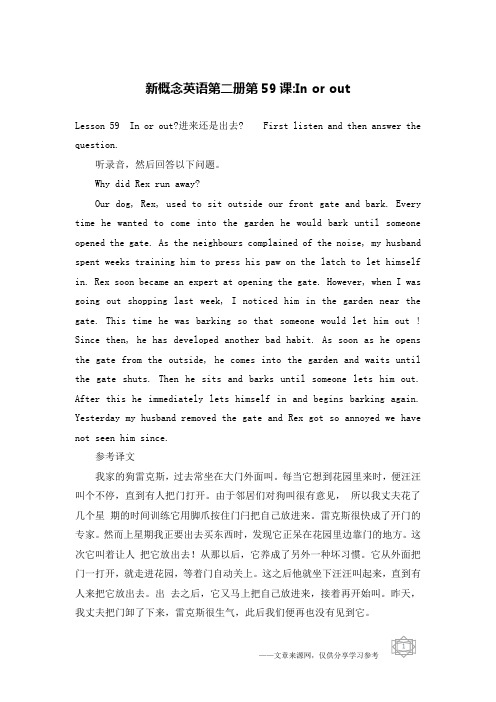新概念英语第二册Lesson59
新概念英语第二册第59课-In or out

新概念英语第二册第59课:In or outLesson 59 In or out?进来还是出去? First listen and then answer the question.听录音,然后回答以下问题。
Why did Rex run away?Our dog, Rex, used to sit outside our front gate and bark. Every time he wanted to come into the garden he would bark until someone opened the gate. As the neighbours complained of the noise, my husband spent weeks training him to press his paw on the latch to let himself in. Rex soon became an expert at opening the gate. However, when I was going out shopping last week, I noticed him in the garden near the gate. This time he was barking so that someone would let him out ! Since then, he has developed another bad habit. As soon as he opens the gate from the outside, he comes into the garden and waits until the gate shuts. Then he sits and barks until someone lets him out. After this he immediately lets himself in and begins barking again. Yesterday my husband removed the gate and Rex got so annoyed we have not seen him since.参考译文我家的狗雷克斯,过去常坐在大门外面叫。
新概念英语第二册课堂笔记:第59课

新概念英语第二册课堂笔记:第59课lesson 59bark v 狗叫press v 按,压paw n 脚爪latch n 门闩expert n 专家develop v 养成habit n 习惯remove v 拆掉,取下the dog is barkingsomebody is barking某人在咆哮cat's paw被人所利用的人i don't want to be a cat's paw我才不想被人利用bar门闩expert at/in在某一方面是专家expert at/in doing sthdevelop the file冲洗胶卷develop:发展developing skills:发展技巧developing country:发展中国家developed country发达国家bliling water滚开水boiled water开水custom:风俗,习俗customs海关customer顾客remove sth from从...挪走textOur dog, Rex, used to sit outside our front gate and bark. Every time he wanted to come into the garden he would bark until someone opened the gate. As the neighbours complained of the noise, my husband spent weeks training him topress his paw on the latch to let himself in. Rex soon became an expert at opening the gate. However, when I was going out shopping last week, I noticed him in the garden near the gate. This time he was barking so that someone would let himout ! Since then, he has developed anotherbad habit. As soon as he opens the gatefrom the outside, he comes into the gar-den and waits until the gate shuts. Thenhe sits and barks until someone lets him out. After this he immediately lets himselfin and begins barking again. Yesterday my husband removed the gate and Rexgot so annoyed we have not seen him since.let sb in让某人进来let sb out让某人出去let sb down让某人失望let‘s like let's go and so onfront gatewould=used toevery time=whenthe monment=as soon asthe monment一...就...(强调的是瞬间every time:每次,每当every time i turn to lesson 59,i will remember my teachercomplaim of抱怨。
新概念英语第二册Lesson58~60课文注释

【导语】新概念英语作为家喻户晓的经典之作,它有着全新的教学理念,有趣的课⽂内容及其全⾯的技能训练,为⼴⼤的英语学习者提供帮助!如果你也想学好英语,⼜怎能错过新概念英语?下⾯为您提供了相关内容,希望对您有所帮助!新概念英语第⼆册Lesson58课⽂注释 1.The tiny village of Frinley is said to possess a‘cursed tree’.据说弗林利这个⼩村⾥有⼀棵“该诅咒的树”。
(1)主语+ be said+…这种结构通常译为“据说……”是对不太有把握的事发表看法时⼀种谨慎的说法。
(cf.本课语法) (2)of在这⾥表⽰同位关系,如 the city of London/New York(伦 敦/纽约市);at the age of twenty(20岁时); a height of three feet(3英尺的⾼度)。
2.…the number of visitors to Frinley has now increased.……现在来弗林利参观的⼈越来越多。
the number of表⽰“……的数量/总数”,它作主语时谓语动词要⽤单数,虽然visitors是复数。
注意它与a number of(许多,若⼲)的区别: The number of patients in this hospital has increased. 这家医院的病⼈越来越多。
A number of patients have asked to see you. 许多病⼈要求见您。
(动词⽤复数形式) 3.…it is only in recent years that it has gained an evil reputation.……只是近⼏年才得到了⼀个坏名声。
句中的 it is…that是个强调句型。
如果我们想要强调某个词或某个短语,我们可以⽤ it is/was+被强调的成分+that/ who(m)结构。
新概念英语第二册第59课课件

habit n. 习惯,习性;嗜好 bad habit 坏习惯 good habit 好习惯 in the habit of 有…习惯 form the habit of 养成…的习惯 remove v. 移动,迁移;搬家 n. 移动;搬家;距离 remove all 删除所有;全部移 除 remove from 除掉;移动
Paw v. 抓,扒;亲昵地抚摸 n. 爪子;手 cat‘s paw 傀儡;受人利用者 latch vt. 闩上;纠缠住某人 n. 门闩 expert adj. 熟练的;内行的;老练的 n. 专家;行家;能手 vt. 当专家;在…中当行家
翻译练习: He had become an expert. He is an expert at singing pop songs. I'll ask an expert to price the old car. develop v. 开发;进步;使成长 develop into 发展成为 develop from 成长于;从…发展出来 Eg. All you need to do is develop learning skills. If we want to develop the ability of creative thinking.
That’s all, thank you!
批注本地保存成功开通会员云端永久保存去开通
In or out?
By Esite Lesson 58.
Then, let’s have a words dictation.
First, learning the following new words: bark vt. 吠叫;咆哮;咳嗽 n. 吠声;任何似犬狐叫的声音 bark at 狗朝着(对着)某人叫; 对…狗吠 press v. 压;按;逼迫;紧抱 n. 压;按;新闻;出版社 press the button 按钮;按键 press down 压
新概念英语第二册59课课文

新概念英语第二册59课课文
新概念英语第二册的第59课是关于"An ideal student"(理想的学生)的课文。
以下是对该课文的多角度全面回答:
这篇课文主要描述了一个理想的学生的特点和行为。
理想的学生应该对学习充满热情,努力工作,并且有良好的学习习惯。
他们应该有高度的自律能力,能够合理安排时间,充分利用每一分钟进行学习。
这样的学生会保持专注,并且能够集中精力解决问题。
理想的学生还应该具备良好的沟通能力。
他们能够与老师和同学们积极互动,参与课堂讨论,并且善于表达自己的观点。
他们也应该有良好的阅读和写作技巧,能够理解和分析各种文本,并能够清晰地表达自己的思想。
此外,理想的学生应该有广泛的知识面。
他们应该对各个学科都有一定的了解,并且能够将不同学科的知识联系起来,形成全面的视野。
他们应该保持好奇心,积极主动地探索新的领域,并且能够将所学知识应用到实际生活中。
除了学术方面,理想的学生还应该具备良好的道德品质。
他们
应该诚实守信,尊重他人,并且具备团队合作精神。
他们应该积极参与社会活动,关心他人,并且有意识地为社会做出贡献。
总而言之,理想的学生应该是一个全面发展的个体。
他们不仅在学术上有出色的表现,还具备良好的沟通能力、广泛的知识面和良好的道德品质。
他们是积极进取、乐于学习和与他人合作的人。
这样的学生将为自己的未来打下坚实的基础,并且对社会做出积极的贡献。
希望以上回答能够满足你的要求。
如果还有其他问题,请随时提问。
新概念英语第二册-Lesson-59(共27张PPT)

②develop the film 冲洗胶卷
★habit n. 习惯(指个人习惯) Stop biting your nails. It’s a bad habit.
She has a habit of playing with her hair while reading.
He has the habit of staying up late他有熬夜的习惯。
★develop v. 养成 develop a habit ① vt. &vi. 发展,扩展 The village has developed into a town now. developing country 发展中国家 ; developed country 发达国家 V-ed 强调已经,V-ing 强调正在,有时态的区别 boiling water 滚开水 ; boiled water 开水
TEXT
Language points
Our dog, Rex, used to sit outside our front gate and bark.
front gate 前门 would=used to 过去常常 Would表示过去的习惯性动作,在一般过去时的
句子中经常与“ever time”连用: Every time we met, we would talk for a while. Every time he came to the restaurant, he
★remove v. 拆掉, 取下 remove the dishes 撤去碗碟 remove one’s hat 脱掉帽子 My husband removed the gate. 拆门 The player was removed from the team. 开除 remover 迁移者,搬运工;清除剂
新概念第二册Lesson59 60

2. every time
“每当,无论何时” 此处是作为连词,引导后面的时间状 语从句。
Every time he wanted to come into the garden he would bark until someone opened the gate .
3. complain vi : 抱怨,诉苦,发牢骚;申诉 vt: 抱怨,控诉 (后面常跟从句)
They never complain about working overtime . 他们对加班加点从来不抱怨。 I have to complain to the manager about it . 对于这件事我不得不向经理申诉。
He complained that the examination was too hard. 他抱怨考试太难了。 He complained to the police that the boys had stolen his bike . 他向警方控告说那些 男孩偷了他的自行车。 Complain : complain about sth 抱怨某事 complain of sth 抱怨,抗议
develop ability 发挥才能 develop into 发展成为 develop confidence in sb 对某人产生信任
6. since 自从 句子中出现since / since then ,一般要用 现在完成时。有since 的从句用一般过 去时,主句用完成时。 Since then , he has develop a bad habit . We haven’t seen Lily since we graduated from school .
3. So as (not)to 为的是(不) I closed the door quietly so as not to disturb him . 我轻轻地关门为的是不打扰他。
新概念第二册课后题答案详解Lesson59

新概念第二册课后题答案详解Lesson59新概念英语第二册课后习题 Lesson 591. d根据课文第3-4行 As the neighbours complained of the noise, my husband spent weeks training him 能够看出只有d. Rex barked a lot and disturbed the neighbour 与课文的实际情况相符,其他3个选择都与课文的事实不符。
所以选d.2. b根据课文第5-8行Rex soon became an expert at opening the gate… This time he was barking so that someone would let him out! 可判断出只有b. Rex only learnt to open the gate from the outside (雷克斯只学会了从外边开门)与课文的实际情况相符,所以选b. 其他3个选择都与课文的实际情况不符。
3. d前面句子中的谓语would bark表示过去习惯性动作,所以该句只有选d. used to do(过去常做)才能同前一句的意思相符合.而其它3个选择都不对.a. is used to doing(习惯于做某事),不表示过去常做; 所以不对.4. d该句中的complained 只能同介词of 或about 连用构成动词短语,表示"抱怨,诉苦"所以只有D.是准确的.a. for,b. to,c. concerning 都不能与complain 构成准确搭配.只有d. shopping 能够同句中的went 连用构成短语,went shopping(go shopping)意思是去买东西,所以准确答案是d.其他3个选择都不合乎语法和习惯用法.6. a只有a. for someone to 放在这个句子中意思才通顺,“它喊叫着让人把它放进来”,其他3个选择意思都讲不通。
- 1、下载文档前请自行甄别文档内容的完整性,平台不提供额外的编辑、内容补充、找答案等附加服务。
- 2、"仅部分预览"的文档,不可在线预览部分如存在完整性等问题,可反馈申请退款(可完整预览的文档不适用该条件!)。
- 3、如文档侵犯您的权益,请联系客服反馈,我们会尽快为您处理(人工客服工作时间:9:00-18:30)。
custom n. 风俗,习俗 ; customs n. 海关 ; customer n. 顾客 develop a good habit He slipped into bad habits. He has the habit of staying up late.
Lesson 59 In or out
By:Lynn
Do you have any pets? Do they have any strange habits?
Key words & expressions
Rex
bark
v.
press v.
paw
n.
latch
n.
雷克斯 狗叫 按,压 脚爪 门闩
removed the gate?
Language points
1、Our dog, Rex, used to sit outside our front gate and bark.
front gate 前门 would=used to
过去常常
Language points
2.Every time he wanted to come into the garden he would bark until someone opened the gate.
→sb. spend time (in) doing sth./on sth. →花t费ra某in段sb时. t间o d去o做st某h.事(训人练作某主人语做)某事 IH→12→→se..Ip我他时pltplle12heeertrt..花已aa间ttene他我sksssstsb了经(ebbsts打们sw.s..pht两在事dodi开应hseniosoebn个这w情门该wp.stbeta星项s做na让u让刻heowt.kl期目主tm某o我苦osotne让来上语人n(进学oi让n=tft某读花i)进hm去习)t某pierm人这了e来re。,e人lseaa失本很s不d;tt做socoi望书多nnh让t某dhgtl。时=oeeh父t事tihpsfs间i母sitrgshpeb。u.失rsb.rosooe某j望eoutohckt事。net..花让tlhaet了某cbh某人ut人出ton多去少
Key words & expressions
★remove v. 拆掉, 取下
remove sth. from 从……挪走
she saw he had removed his glasses. He removed the picture from the wall.
被免职;撤去
He was removed from the post.
Key words & expressions
expert
n.
develop a habit
remove
v.
annoyed
adj.
专家 养成 words & expressions
★bark v. 狗叫
The dog is barking.
sb. is barking. 某人在咆哮
developing country 发展中国家 ; developed country 发达国家
V-ed 强调已经,V-ing 强调正在,有时态的区别 boiling water 滚开水 ; boiled water 开水
②develop the film 冲洗胶卷
Key words & expressions
The dog barked at the visitor.
Key words & expressions
★press v. 按, 压
① vt.&vi. 按,挤,压 Can you press that button for me please? ②vt. 催促,敦促,竭力劝说 I don’t like to be pressed. 我不喜欢被人催促。
★expert n. 专家
expert at/in sth. 在某一方面是专家 expert at/in doing sth.
He is an expert in maths.
Key words & expressions
★develop v. 养成 develop a habit
① vt. &vi. 发展,扩展 The village has developed into a town now.
Questions on the text
1. Why did the writer’s husband spend weeks training the dog to open the front gate?
2. What bad habit has the dog developed? 3. What happened when the writer’s husband
pressure
n. 压, 压力, 电压, 压迫, 强制, 紧迫
Key words & expressions
★paw n. 脚爪 The cat’s paw was burnt. My dog’s paw was bleeding.
cat's paw 被利用的人(由寓言而来)
I don‘t want to be a cat’s paw. 我才不想被人利用 。
)
Language points
complain about
3、As the neighbors complained of the noise, my husband spent weeks training him to press his paw on the latch to let himself in.
every time=when 每当,每次,无论何时
(every time在这里为连词引导一个时间状语从句,表示 “每次”、“每当”,主句中的would表示过去的习惯性 动作。用一般过去时的句子中它们经常连用)
Every time we met, we would talk for a while. 我们每次见面都要聊一会儿。 He brought a present every time he came to visit us. 他每次来看我们都带一份礼物。 the moment=as soon as 一……就……(强调的是瞬间
Key words & expressions
★latch n. 门闩
latch n. 门闩(庭院,花园中的门闩) bar n. 门闩(与 latch不同) You can’t walk in because the door is on the
latch.
Key words & expressions
